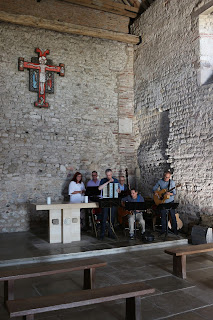In Psalm 33. 1-4, 18-end, the Psalmist encourages us to:
Praise the Lord with the lyre;
make melody to him with the harp of ten strings.
Sing to him a new song;
play skilfully on the strings, with loud shouts.
When Peter Banks and I wrote our book ‘The Secret Chord’ we took the title phrase from the song “Hallelujah” which is now one of the most-performed rock songs in history. Leonard Cohen's song ‘Hallelujah’ makes the claim that the Biblical King David had found a secret chord which, when played, pleased even God himself.
The opening words to Cohen's song are extrapolated from the account in 1 Samuel 16: 14-23 of how King Saul asked for a skillful musician to be found so they could come and play to soothe Saul's troubled soul. It is clear that David was both a competent musician and also a prolific composer. According to the Scriptures, he would go on to curate and compose many of the 150 Psalms found in the Bible which survive in multiple translations as part of religious worship today. What Cohen surmises is that whatever David played, or, most likely, improvised, would have also pleased the Lord and the children of Israel's God, as well as calming down King Saul.
Cohen's romantic hypothesis is that David had actually stumbled across and therefore deliberately employed a particular chord that has this mysterious power. A chord is a group of (typically three or more) notes sounded together, as a basis of harmony. Arthur Sullivan in a song called ‘The Lost Chord’ wrote: ‘It seemed the harmonious echo / From our discordant life. / It linked all perplexèd meanings / Into one perfect peace.’
Music is a performance in which harmonies echoing from our discordant lives link all perplexèd meanings into one perfect peace. Music, in performance, is an unrepeatable moment in in which all things come together enabling us to feel God's pleasure. In this sense the Secret Chord, about which Cohen writes, is indeed pleasing to the Lord.
Peter Banks remembers this occurring for him on 15th September 2001 when American conductor Leonard Slatkin led the BBC Orchestra in a dramatic rendition of Samuel Barber's Adagio for Strings at the BBC Proms. This was a change added to the usual program of jingoistic ditties that is regularly played at the Last Night of The Proms. Proximity to the tragedy of 9/11 helped to make it spine tingling for those present in the Royal Albert Hall at the time, as well as those viewing on TV. This was not an aggressive response to 9/11, but a truly spiritual one, with everyone experiencing something of God through the pain and suffering. There was a coming together of music and context which created a performance that took on greater significance after the actual event as time passed and as its cache built through word of mouth.
As a result of this linking of the echoes from our discordant lives, Cohen’s Hallelujah includes both the sacred and the sinful – the holy and the broken Hallelujah. It doesn’t matter which you heard, he suggests, because a blaze of light is found in every word and he will be able to stand before God – the Lord of Song – presumably at the Last Judgement and simply sing Hallelujah itself because both the holy and the broken are encapsulated in the one word and one chord.
This is to say that distinctions between sacred and secular are false divides as all of life and all music is holy. Cohen once said, 'This world is full of conflicts and full of things that cannot be reconciled, but there are moments when we can transcend the dualistic system and reconcile and embrace the whole mess, and that's what I mean by "Hallelujah".'
That’s also why Arthur Sullivan could write:
‘I struck one chord of music,
Like the sound of a great Amen.
It flooded the crimson twilight,
Like the close of an angel's psalm,
And it lay on my fevered spirit
With a touch of infinite calm.
It quieted pain and sorrow,
Like love overcoming strife;
It seemed the harmonious echo
From our discordant life.
It linked all perplexèd meanings
Into one perfect peace,
And trembled away into silence
As if it were loth to cease.’
Ultimately, music is a symbol of the means by which God created, and the musician is a partner with God in the creative process. Therefore, we can pray, with the singer-songwriter Bruce Cockburn, to be a little of God’s creative breath as it moves over the waters of chaos to bring all things into being. In other words, to see and hear life as God sees and hears it and to articulate something of that unitive vision. Amen.
------------------------------------------------------------------------------------------------------
Jeff Buckley - Hallelujah.







